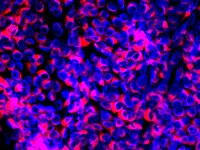
Photo from wikipedia
A recent report on an outbreak of mucosal disease (MD) from northern Ireland (VR, February 4, 2017, vol 180, p 112) has created much discussion among vet colleagues at meetings.… Click to show full abstract
A recent report on an outbreak of mucosal disease (MD) from northern Ireland (VR, February 4, 2017, vol 180, p 112) has created much discussion among vet colleagues at meetings. Bovine viral diarrhoea (BVD)/MD was diagnosed at postmortem examination in two 12-month-old cattle from a herd where seven animals within the group had died within the last week. Severe clinical signs, common in classical MD, were reported, and BVD virus Pcr confirmed the diagnosis. the group of animals were persistently infected (PIs) and had been diagnosed as such on ear tissue tag testing as part of the Animal Health and Welfare northern Ireland (AHWnI) BVD eradication Programme. contrary to recommendations, these PIs had not been removed, but instead had been grown on in the hope of finishing them. this case has prompted much discussion especially as many vets in northern Ireland, and other areas, suspect that PIs are being retained on farm. If some kind of biosecurity breach takes place, BVD could get into a herd and a batch of PIs can be born. It is all too easy to forget that they will all have an almost identical strain of BVD virus. If, or more accurately when, the virus mutates into a cytopathic biotype in one animal, this will quickly spread throughout the PIs and MD will sweep through the entire group. this is because of the similarity in the strain of BVD virus in all animals within the group. this is a really important point; the risk to a PI of developing MD is not on an individual basis, but across the whole group. As a profession we should continue to work to educate farmers as to why retaining PIs is a potentially dangerous and very high risk strategy.
Journal Title: Veterinary Record
Year Published: 2017
Link to full text (if available)
Share on Social Media: Sign Up to like & get
recommendations!